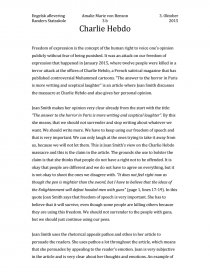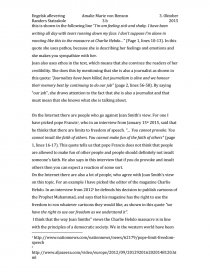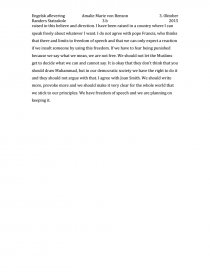Charlie Hebdo
Essay by Amalievonbenzon • December 11, 2015 • Term Paper • 961 Words (4 Pages) • 1,100 Views
Charlie Hebdo
Freedom of expression is the concept of the human right to voice one’s opinion publicly without fear of being punished. It was an attack on our freedom of expression that happened in January 2015, where twelve people were killed in a terror attack at the offices of Charlie Hebdo, a French satirical magazine that has published controversial Muhammed cartoons. “The answer to the horror in Paris is more writing and sceptical laughter” is an article where Joan Smith discusses the massacre at Charlie Hebdo and also gives her personal opinion.
Joan Smith makes her opinion very clear already from the start with the title: “The answer to the horror in Paris is more writing and sceptical laughter”. By this she means, that we should not surrender and stop writing about whatever we want. We should write more. We have to keep using our freedom of speech and that is very important. We can only laugh at the ones trying to take it away from us, because we will not let them. This is Joan Smith’s view on the Charlie Hebdo massacre and this is the claim in the article. The grounds she use to bolster the claim is that she thinks that people do not have a right not to be offended. It is okay that people are different and we do not have to agree on everything, but it is not okay to shoot the ones we disagree with. “It does not feel right now as though the pen is mightier than the sword, but I have to believe that the ideas of the Enlightenment will defeat hooded men with guns” (page 1, lines 17-19). In this quote Joan Smith says that freedom of speech is very important. She has to believe that it will survive, even though some people are killing others because they are using this freedom. We should not surrender to the people with guns, but we should just continue using our pens.
Joan Smith uses the rhetorical appeals pathos and ethos in her article to persuade the readers. She uses pathos a lot throughout the article, which means that she persuades by appealing to the reader’s emotion. Joan is very subjective in the article and is very clear about her thoughts and emotions. An example of this is shown in the following line “I’m am feeling sick and shaky. I have been writing all day with tears running down my face. I don’t suppose I’m alone in reacting like this to the massacre at Charlie Hebdo…” (Page 1, lines 10-13). In this quote she uses pathos, because she is describing her feelings and emotions and she makes you sympathize with her.
Joan also uses ethos in the text, which means that she convince the readers of her credibility. She does this by mentioning that she is also a journalist as shown in this quote: “Journalists have been killed, but journalism is alive and we honour their memory best by continuing to do our job” (page 2, lines 56-58). By saying “our job”, she draws attention to the fact that she is also a journalist and that must mean that she knows what she is talking about.
On the Internet there are people who go against Joan Smith’s view. For one I have picked pope Francis[1], who in an interview from January 15th 2015, said that he thinks that there are limits to freedom of speech. “… You cannot provoke. You cannot insult the faith of others. You cannot make fun of the faith of others” (page 1, lines 16-17). This quote tells us that pope Francis does not think that people are allowed to make fun of other people and people should definitely not insult someone’s faith. He also says in this interview that if you do provoke and insult others then you can expect a reaction of some sort.
...
...


